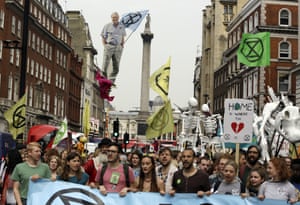I worked on David Attenborough’s documentary. The grim reality gave me climate anxiety
For the BBC’s Climate Change: The Facts, I met those living on the frontline. I struggled to cope with what I learned
What followed were four months of desperately tracking down and interviewing the people who live on the frontline of climate change. I spoke to scientists who described the so-loud-it-gives-you-whiplash crack of a glacier calving off the Greenland ice shelf. Another told me of the horror he felt when his calculations revealed that the current logging and burning of tropical forests releases more carbon dioxide than our remaining forests could possibly absorb. I read detailed and disturbing death threats sent to climate activists to make them go quiet.
My nights became ones of sleeplessness with a racing heart. I have been hit by a panic attack in the supermarket
I listened to people who have lost their homes and heritage to rising sea levels. I watched countless videos of wildfires ripping through suburbia, and cannot forget the little girl’s voice in the background of one shaky mobile phone recording asking her daddy if she was going to catch fire. Still, the most upsetting videos I saw were of politicians and pundits spreading harmful lies, promoting their own interests at the cost of protecting children from climate change.It was a privilege to hear these stories, but I struggled to cope with what I learned. Climate anxiety, as I think of it, crept into my mind and body, and settled as an incoherent anger. My nights became ones of sleeplessness with a tight racing heart. I have been hit by a panic attack in the snack aisle of a supermarket, overwhelmed by the countless choices and their consequences. Hot sunny days in April scare me. I cannot stop thinking about climate change.

I have always been a happy-go-lucky kind of gal, and it has been frightening to be feeling physically sick with nervousness for the first time in my life. I am far from the first person to have felt this way, and there is a rapidly growing body of literature on the psychological impact of climate change. In 2009, an article in the public health journal the Lancet stated that “climate change is the biggest global health threat of the 21st century”, and then last year a report listed the ways in which climate change affects mental health: the rise of extreme temperatures exacerbates anxiety and depression, the spread of vector-borne diseases will cause a cascade of cognitive and neurological issues, and freakish weather events will trigger post-traumatic stress disorder.

Aldo Leopold, the great American ecologist, wrote that “one of the penalties of an ecological education is that one lives alone in a world of wounds”; and as beautiful as that may be, I hope that if we open these wounds to others we may be able to transform our pain into strength.
• Liv Grant is a conservationist and documentary film-maker. She is a Scientific Exploration Society explorer and is working on a documentary about the Marquesas Islands.
Article Found Here:

Comments (0)